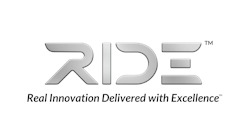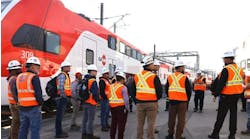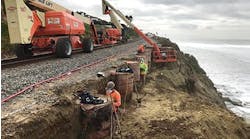Metro officials on April 22 celebrated Earth Day at Metro’s Central Maintenance Facility by dumping 4,800 lbs. of waste to represent the amount of carbon emissions reduced from the air when an individual takes public transit instead of driving for a year. With Metro’s first zero-emission, all-electric bus manufactured by BYD Inc. as the backdrop, speakers highlighted the agency’s sustainability initiatives including a new biomethane fuel program.
The specific weight of the trash used for the event demonstration came from American Public Transportation Association (APTA) research that concluded an individual could reduce their carbon emissions by 4,800 lbs. by commuting 20 miles a day for one year using public transit instead of driving. The trash used was clean, recycleable paper waste from Metro facilities and will be recycled.
“Earth Day serves as an opportunity for Angelenos to focus on steps we can take to live more sustainability, particularly as we face this historic drought,” said Metro Board Chair and L.A. Mayor Eric Garcetti. “I’m proud that Metro is doing its part by reducing its water consumption by 4.3 million gallons a year and encouraging Angelenos to take public transportation with today’s demonstration, reminding us that each one of us plays a key role in preserving our city’s health and longevitiy.”
The Earth Day event marked the first appearance of one of Metro’s new test electric buses. The 40-foot all-electric zero-emission bus was the first of five manufactured by BYD Inc. for Metro as part of a pilot to test clean-air prototype buses that was championed by Metro Board member and L.A. County Supervisor Michael D. Antonovich.
“In addition to the largest all clean-burning natural gas fleet in North America – 97 percent cleaner than the diesel buses they replaced – Metro has added all-electric, zero-emission 40-foot buses that will reduce carbon monoxide, greenhouse gases as well as operating costs,” said Supervisor Antonovich, who is also on the board of the South Coast Air Quality Management District (SCAQMD).
The buses will soon be placed into revenue service as part of their testing and evaluation. Based on their performance, Metro has the option to purchase 20 more.
Metro officials also highlighted the agency’s upcoming biomethane fuel program. Once implemented, Metro will only purchase its fuel from biomethane producing facilities. Biomethane is considered a low carbon fuel because it is produced by capturing gas that is emitted from landfills, dairies, and wastewater treatment plants. The fuel can be used on Metro’s existing fleet and is expected to offset the fleet’s already low greenhouse gas emissions by more than 78 percent.
“Metro’s ongoing investments in cleantech ensure we’re prepared for the future as our system continues to expand,” said Metro Interim Deputy CEO Stephanie Wiggins. “To serve such a vast area as L.A. County takes a great amount of resources, but we recognize our responsibility to conserve energy, reduce waste and make transportation more sustainable.”
As of 2014, Metro’s sustainability efforts result in a 4.3 million gallon reduction in the agency’s water consumption annually, a reduction of greenhouse gas emissions by 23,000 metric tons a year, and a reduction of energy consumption from its facilities of 7 million kilowatt-hours a year. These reductions save taxpayers around $3 million annually. Metro riders are responsible for an estimated reduction of 2.5 million pounds of carbon emissions a year.
In addition to the new initiatives mentioned above, other Metro environmental programs and projects that make Metro a leader in transportation sustainability include:
- Metro will soon complete construction on its state-of-the-art Division 13 bus operations and maintenance facility, which includes a 275,000 gallon underground storm water retention tank, a vehicle wash system that utilizes 100 percent recycled water, a green roof garden to curb urban heating effects and high-efficiency solar panels installed on its roof and exterior walls. The facility is expected to be Leadership in Energy and Environmental Design (LEED) gold certified.
- Metro has the nation’s largest clean-air compressed natural gas fleet of more than 2,200 buses.
- By July 2015, all of Metro’s bus and rail maintenance facilities will be International Standards Organization (ISO)-14001 certified, which signifies a level of international excellence in its operations to reduce its environmental impact and safety risks as well as minimizing waste and costs.
- Metro has installed solar panels on four maintenance facilities and the El Monte Station with two more under construction, creating the largest installation of solar panels for a transit agency in the U.S., capable of powering 2,500 homes at any given time.
- Metro is the first public transportation agency that has directly incorporated electric vehicle (EV) charging stations as part of the transit system.
- Metro is the first transit agency in the U.S. to apply flywheel technology to reduce energy use on its trains.
Metro is the third largest transit agency in the nation serving nearly 40 million passengers a month over an area of 1,433 square miles. It operates 87 miles of rail servicing 80 stations and more than 2,200 buses servicing 15,967 stops on 170 routes. The agency is supported by approximately 10,000 employees at 17 major bus and rail divisions and its 25-story headquarters building.
The event was held at Metro’s Central Maintenance Facility (CMF), one of the greenest transportation facilities in the world that features 6,720 individual solar panels on its roof capable of powering 1,000 homes at any time. It is a LEED Gold certified facility.



